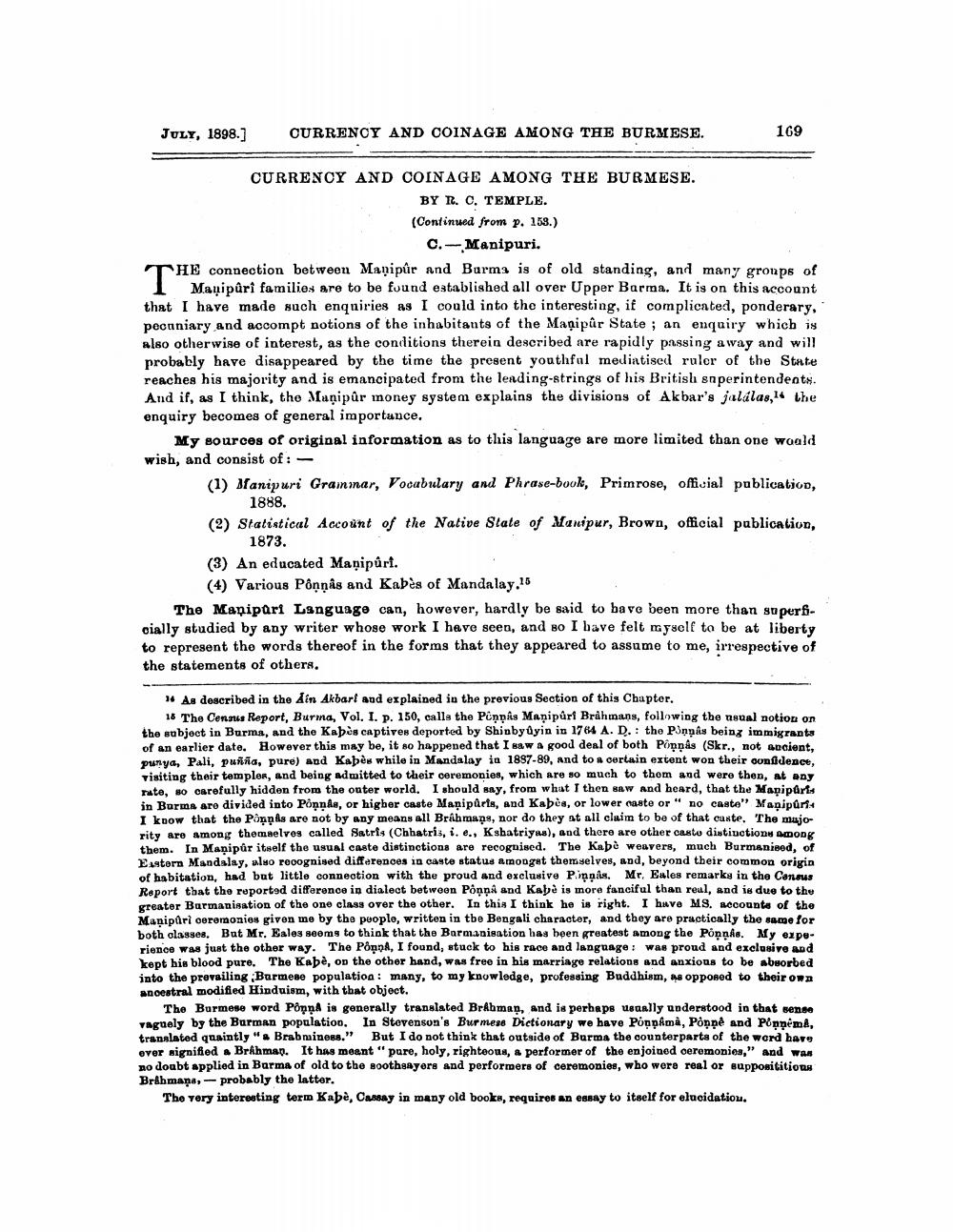________________
CURRENCY AND COINAGE AMONG THE BURMESE.
169
CURRENCY AND COINAGE AMONG THE BURMESE.
BY R. C. TEMPLE. (Continued from p. 159.)
C.- Manipuri. THE connection between Manipûr and Burma is of old standing, and many groups of
1 Maụipûri families are to be found established all over Upper Barma. It is on this account that I have made such enquiries as I could into the interesting, if complicated, ponderary, pecuniary and accompt notions of the inhabitants of the Manipûr State ; an enquiry which is also otherwise of interest, as the conditions therein described are rapidly passing away and will probably have disappeared by the time the present youthful mediatised ruler of the State reaches his majority and is emancipated from the leading-strings of his British snperintendents. And if, as I think, the Manipur money system explains the divisions of Akbar's juldlas, 14 the enquiry becomes of general importance,
My sources of original information as to this language are more limited than one woald wish, and consist of: -
(1) Manipuri Grammar, Vocabulary and Phrase-book, Primrose, official publication,
1888. (2) Statistical Account of the Native State of Manipur, Brown, official pablication,
1873. (3) An educated Manipuri.
(4) Various Ponnas and Kabes of Mandalay.15 The Manipari Language can, however, hardly be said to bave been more than so perfcially studied by any writer whose work I have seen, and so I bave felt myself to be at liberty to represent the words thereof in the forms that they appeared to assume to me, irrespective of the statements of others.
"As described in the Ain Akbart and explained in the previous Section of this Chapter.
16 The Census Report, Burma, Vol. I. p. 150, calls the Pinpas Manipuri Brahmans, following the nsual notion on the subject in Burma, and the Kabès captives deported by Shinbyuyin in 1764 A. D. : the P3npas being immigrants of an earlier date. However this may be, it so happened that I saw a good deal of both Ponnas (Skr., not apcient, punya, Pali, puiña, pure) and Kapow while in Mandalay in 1887-89, and to a certain extent won their ounidence, visiting their templer, and being admitted to their ceremonies, which are so much to thom and were then, at any rute, ho carefully hidden from the outer world. I should say, from what I then anw and heard, that the Mapiparis in Burma are divided into Põnne, or higher caste Maniparts, and Kabès, or lower casto or " no caste" Manipurit I know that the Ponnis are not by any means all Brehmans, nor do they at all claim to be of that custe. The maiority are among themselves called Satris (Chhatris, i.e., Kshatriyas), and thoro are other casto distinctions among them. In Manipur itself the usual caste distinctions are recognised. The Kabo Wouvers, much Burmanised, of Estern Mandalay, also rooognised differences in caste status amongst themselves, and, beyond their common origin of habitation, had but little connection with the proud and exclusive Pinas. Mr. Eales remarks in the Consus Report that the reported difference in dialect between Pônpå and Kaba is more fanciful than reul, and is due to the creater Barmanisation of the one class over the other. In this I think he is right. I have MS. accounts of the Manipuri ceremonies given me by the people, written in the Bengali character, and they are practically the same for both classes. But Mr. Eales seems to think that the Bormanisation has been greatest among the Pönnte. rience was just the other way. The PÔnnA, I found, stuck to his race and language: was proud and exclusive and kept his blood pure. The Kabe, on the other hand, was free in his marriage relations and anxious to be absorbed into the prevailing Burmese population : many, to my knowledge, professing Buddhism, 48 opposed to their own ancestral modified Hinduism, with that object.
The Burmese word Porn is generally translated Brahman, and is perhaps usually understood in that sense vaguely by the Burman population. In Stevenson's Burmese Dictionary we have Poppima, Ponpe and PoppemA, translated quaintly ". Brabminess." But I do not think that outside of Burma the counterparts of the word have ever signified a Brahman. It has meant "pure, holy, righteous, a performer of the enjoined oeremonies," and was no doubt applied in Barma of old to the soothsayers and performers of ceremonies, who were real or supposititions Brahmana, - probably the latter.
The very interesting term Kabe, Cassay in many old books, requires an essay to itself for elucidatiou,




